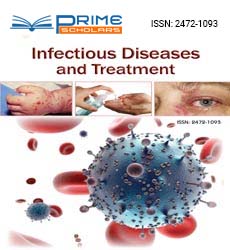Short Communication - (2023) Volume 9, Issue 7
Exploring the Intersection of COVID-19 Prophylaxis and Glomerulopathies
Omri Dominski*
Department of Pathology, University of Bonn, Germany
*Correspondence:
Omri Dominski,
Department of Pathology, University of Bonn,
Germany,
Email:
Received: 03-Jul-2023, Manuscript No. IPJIDT-23-17604;
Editor assigned: 05-Jul-2023, Pre QC No. IPJIDT-23-17604 (PQ);
Reviewed: 19-Jul-2023, QC No. IPJIDT-23-17604;
Revised: 24-Jul-2023, Manuscript No. IPJIDT-23-17604 (R);
Published:
31-Jul-2023, DOI: 10.36648/2472-1093-9.7.63
Introduction
The COVID-19 pandemic has brought to light the complex interplay
between the virus and various underlying health conditions.
Among these, the relationship between COVID-19
prophylaxis and glomerulopathies has garnered attention due
to potential implications for both disease prevention and management.
Glomerulopathies are a group of kidney disorders
affecting the glomeruli, the kidney’s essential filtration units.
Understanding how COVID-19 prophylaxis interacts with these
conditions is vital for optimizing patient care and minimizing
risks. COVID-19 prophylaxis involves the administration of medications,
such as antiviral drugs or monoclonal antibodies, to
prevent or reduce the severity of COVID-19 in individuals who
are at high risk of exposure. This includes individuals with underlying
health conditions, immune compromised individuals,
and healthcare workers. While these prophylactic measures
have proven effective in reducing the risk of infection and severe
disease, their impact on specific health conditions like glomerulopathies
warrants closer examination. Glomerulopathies
encompass a range of kidney disorders characterized by damage
to the glomeruli, which play a vital role in filtering waste
products and excess fluid from the blood. Conditions like IgA
nephropathy, membranous nephropathy, and focal segmental
glomerulosclerosis (FSGS) fall under the umbrella of glomerulopathies.
These disorders can lead to proteinuria (presence of
excess proteins in urine), hematuria (blood in urine), reduced
kidney function, and, in severe cases, kidney failure. While
COVID-19 prophylaxis has been crucial for preventing infection,
its effects on individuals with glomerulopathies are complex.
Some prophylactic agents, especially monoclonal antibodies,
may have potential implications for kidney function. For instance,
monoclonal antibodies could interact with the immune
system in ways that impact the underlying glomerulopathy or
the kidney’s ability to filter blood.
Description
The decision to administer COVID-19 prophylaxis in individuals
with glomerulopathies requires a careful risk-benefit assessment.
Healthcare providers must weigh the potential benefits
of preventing COVID-19 against the potential risks associated
with the specific prophylactic agent and its impact on kidney
health. Individualized treatment plans that consider the patient’s
overall health status, severity of the glomerulopathy,
and available treatment options are essential. Optimal management
of individuals with glomerulopathies who are candidates
for COVID-19 prophylaxis necessitates a collaborative
approach involving nephrologists, infectious disease specialists,
and primary care physicians. This multidisciplinary team
can help evaluate the potential impact of prophylaxis on kidney
function and determine the most appropriate course of action.
For individuals with glomerulopathies receiving COVID-19 prophylaxis,
regular monitoring of kidney function is essential. This
involves tracking proteinuria, hematuria, and serum creatinine
levels, which provide insights into kidney health. Close follow-
up ensures timely detection of any changes and allows for
adjustments in treatment plans if necessary. Given the evolving
nature of both COVID-19 and glomerulopathies, ongoing research
is critical to understand the specific effects of prophylactic
agents on kidney function. Gathering evidence through clinical
studies and real-world observations can provide valuable
insights into the risks and benefits associated with COVID-19
prophylaxis in individuals with glomerulopathies [1-4].
Conclusion
The interface between COVID-19 prophylaxis and glomerulopathies
highlights the complexity of managing individuals with
underlying health conditions during a pandemic. The decision
to administer prophylactic agents must be approached with
caution, considering the potential impact on kidney health
and overall well-being. A collaborative and patient-centered approach, informed by research and evidence, is essential for
ensuring the best possible outcomes for individuals with glomerulopathies
in the context of COVID-19 prophylaxis.
Acknowledgement
None.
Conflict Of Interest
The author declares there is no conflict of interest in publishing
this article.
References
- Lodigiania C, Iapichinoc G, Carenzo L, Cecconi M, Ferrazzi P, et al. (2020) Venous and arterial thromboembolic complications in COVID-19 patients admitted to an academic hospital in Milan, Italy. Thromb Res 191: 9-14.
[Crossref] [Google Scholar]
- Thachil J, Tang N, Gando S, Falanga A, Cattaneo M, et al. (2020) ISTH interim guidance on recognition and management of coagulopathy in COVID-19. J Thromb Haemost 18: 1023-1026.
[Crossref] [Google Scholar]
- Cohen AT, Spiro TE, Buller HR, Haskell L, Hu D, et al. (2013) Rivaroxaban for thromboprophylaxis in acutely ill medical patients. N Engl J Med 368(6): 513-523.
[Crossref] [Google Scholar]
- Cui S, Chen S, Li X, Liu S, Wang F (2020) Prevalence of venous thromboembolism in patients with severe novel Coronavirus Pneumonia. J Thromb Thrombolysis 18: 1421-1424.
[Crossref] [Google Scholar]
Citation: Dominski O (2023) Exploring the Intersection of COVID-19 Prophylaxis and Glomerulopathies. J Infect Dis Treat. 9:63.
Copyright: © 2023 Dominski O. This is an open-access article distributed under the terms of the Creative Commons Attribution
License, which permits unrestricted use, distribution, and reproduction in any medium, provided the original author and source
are credited.
